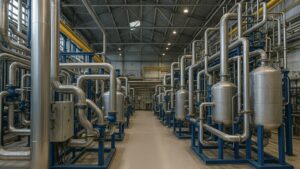In a landmark decision, the European Parliament has agreed that all new vehicles sold in the European Union will have to be zero-emission by 2035. This ambitious move is part of the EU’s broader plan to reduce carbon emissions and combat climate change. The decision has been praised by environmental activists, who see it as a significant step towards a more sustainable future. However, it has also raised concerns among some car manufacturers who may struggle to meet the new requirements. In this blog post, we will explore the implications of this decision, what it means for the future of transportation in Europe, and how it will impact the automotive industry as a whole.
In a bold move towards a greener future, the European Parliament has announced that all new vehicles sold in the European Union must be zero-emission by 2035. This means that new cars, vans, and trucks will have to be powered by electricity, hydrogen, or other clean sources of energy. This decision is part of the EU’s ambitious climate goals to reduce carbon emissions by 55% by 2030 and achieve net-zero emissions by 2050.
The benefits of zero emissions
The benefits of this decision are clear: a significant reduction in air pollution, a decrease in greenhouse gas emissions, and a shift towards renewable energy. Electric cars produce zero emissions, which would greatly improve air quality in cities and reduce the negative health impacts associated with air pollution. This decision is also expected to accelerate the development of renewable energy sources, such as solar and wind power, which will be needed to power the growing number of electric vehicles.
The risks
However, there are also risks associated with this decision. The automotive industry is a significant contributor to the European economy, and this transition to zero-emission vehicles could significantly impact jobs and the economy. Traditional automakers who have invested heavily in internal combustion engines may need help to meet the new requirements and may need to make significant investments to retool their factories for electric vehicles. This could result in job losses and a decline in the competitiveness of the European automotive industry.
The possible outcomes of zero emission vehicles
On the other hand, this decision could also present opportunities for new and innovative companies to enter the market, such as electric vehicle startups and battery manufacturers. It could also lead to increased investment in charging infrastructure, which will be critical to the success of the transition to zero-emission vehicles.
Overall, the European Parliament’s decision to require all new vehicles to be zero-emission by 2035 is a significant step towards a greener and more sustainable future. While there are risks associated with this transition, the benefits of reducing air pollution and greenhouse gas emissions and the shift towards renewable energy make this decision a crucial one for the EU to meet its climate goals. The challenge now is for the automotive industry to adapt to this new reality while ensuring that the transition is as smooth and equitable as possible for all stakeholders.
What companies should do regarding zero-emission vehicles?
The European Parliament’s decision to require all new vehicles to be zero-emission by 2035 is a significant step towards a more sustainable future. While there are risks associated with this transition, the potential benefits in terms of reduced air pollution and greenhouse gas emissions, and the shift towards renewable energy make this decision a necessary one in the fight against climate change.
To ensure a smooth transition to zero-emission vehicles, European businesses must start preparing now. This means investing in new technology, retooling factories, and working with governments to build the necessary infrastructure for electric vehicles. Businesses should also consider partnering with startups and other innovative companies to stay ahead of the curve and tap into new markets.
Moreover, businesses need to work towards a circular economy, where resources are kept in use for as long as possible, and waste is minimized. They must also strive to reduce the carbon footprint of their operations by investing in renewable energy and improving energy efficiency.
In summary, the shift towards zero-emission vehicles presents significant challenges, but also opportunities for businesses to innovate and stay ahead of the curve. With the right preparation and commitment, European businesses can play a leading role in creating a more sustainable future and a cleaner environment for all.
The Global Summit on Scope 3 Emissions Reduction will bring together key industry experts to learn more about reporting strategies & carbon data management in a small-scale, industry-driven event, on 20-21st April 2023 in Amsterdam, the Netherlands. The two-day, hybrid event features in-depth case studies of supply chain transformation, carbon accounting, and networking breaks dedicated to exchanging insights and expertise on tackling Scope 3 emissions. Visit future-bridge.eu and netzero-events.com or follow us on our social media to track other energy use and decarbonization events.





